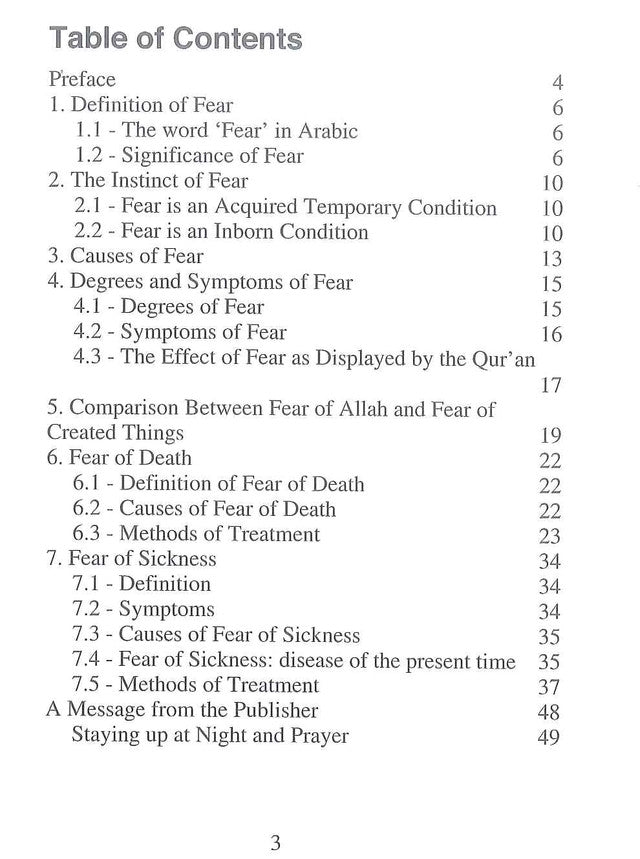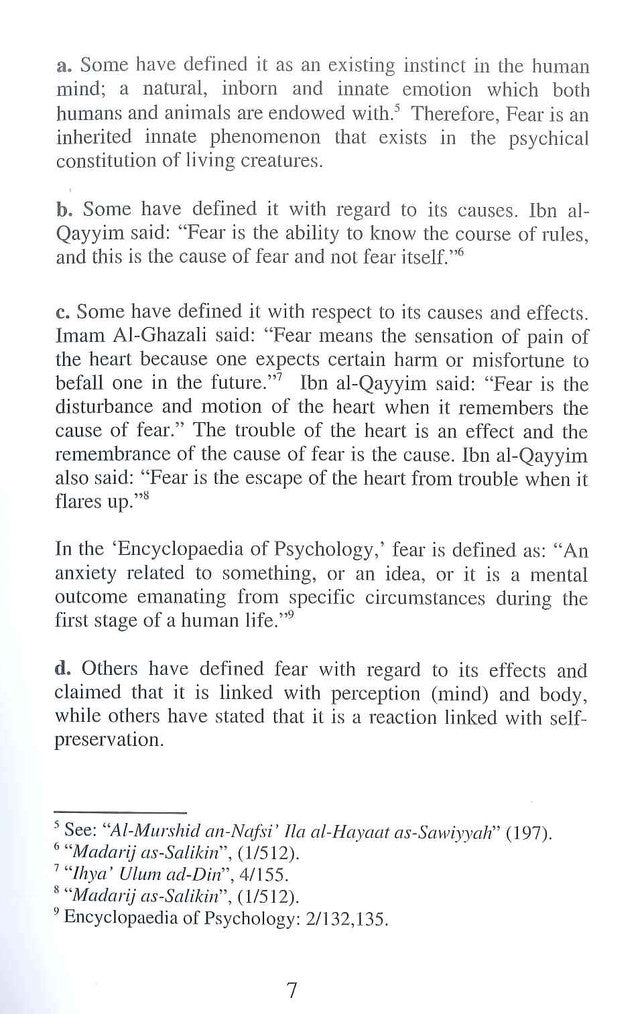Overcoming the Fear of Death & Illness by Dr. Muhammad Abu Rahim
Overcoming the Fear of Death & Illness by Dr. Muhammad Abu Rahim
Publisher:
Al Firdous LTD
Author:
Dr. Muhammad Abu Rahim
Language:
English
Binding:
Paper back
Pages: 70
Size: A5 |5.8 x 8.3 in| 14.8x 21 cm
Couldn't load pickup availability




Collapsible content
Description of Book
Publisher
Al Firdous LTD
Author
- Dr. Muhammad Abu Rahim
Sample Pages - Content
Overcoming the fear of death & illness Dr. Muhammad Abu RahimTable of Contents Preface 1. Definition of Fear 1.1 The word 'Fear' in Arabic 4 6 6 1.2 Significance of Fear 6 2. The Instinct of Fear 10 2.1 - Fear is an Acquired Temporary Condition 10 2.2 Fear is an Inborn Condition 10 3. Causes of Fear 13 4. Degrees and Symptoms of Fear 15 - 4.2 Symptoms of Fear 4.1 - Degrees of Fear 4.3 The Effect of Fear as Displayed by the Qur'an 5. Comparison Between Fear of Allah and Fear of Created Things 6. Fear of Death 6.1 Definition of Fear of Death 15 16 17 19 22 22 6.2 Causes of Fear of Death 6.3 Methods of Treatment 22 23 7. Fear of Sickness 7.1 Definition 34 34 7.2 - Symptoms 7.3 Causes of Fear of Sickness 7.4 Fear of Sickness: disease of the present time 35 7.5 Methods of Treatment A Message from the Publisher Staying up at Night and Prayer 34 35 37 48 49 3a. Some have defined it as an existing instinct in the human mind; a natural, inborn and innate emotion which both humans and animals are endowed with. Therefore, Fear is an inherited innate phenomenon that exists in the psychical constitution of living creatures. b. Some have defined it with regard to its causes. Ibn al- Qayyim said: "Fear is the ability to know the course of rules, and this is the cause of fear and not fear itself."6 c. Some have defined it with respect to its causes and effects. Imam Al-Ghazali said: "Fear means the sensation of pain of the heart because one expects certain harm or misfortune to befall one in the future." Ibn al-Qayyim said: "Fear is the disturbance and motion of the heart when it remembers the cause of fear." The trouble of the heart is an effect and the remembrance of the cause of fear is the cause. Ibn al-Qayyim also said: "Fear is the escape of the heart from trouble when it flares up." In the 'Encyclopaedia of Psychology,' fear is defined as: "An anxiety related to something, or an idea, or it is a mental outcome emanating from specific circumstances during the first stage of a human life." d. Others have defined fear with regard to its effects and claimed that it is linked with perception (mind) and body, while others have stated that it is a reaction linked with self- preservation. 5 See: "Al-Murshid an-Nafsi' Ila al-Hayaat as-Sawiyyah" (197). 6 5 "Madarij as-Salikin", (1/512). 7 "Ihya' Ulum ad-Din", 4/155. 9 "Madarij as-Salikin", (1/512). Encyclopaedia of Psychology: 2/132,135. 7~الفردوس AL-FIRDOUS Al-Firdous Ltd., London ISBN 1-874263-07-8 9781874 263074
Who is Dr. Muhammad Abu Rahim?
Dr. Muhammad Abu Rahim is a respected scholar and author known for his work in combining Islamic teachings with modern psychology. His writings often address personal well-being, mental health, and spiritual growth from an Islamic perspective. With a focus on practical solutions grounded in the Quran and Sunnah, Dr. Abu Rahim offers insights into overcoming challenges such as fear, anxiety, and emotional struggles, helping readers find peace and balance in their lives through faith and psychological strategies. His contributions have earned him recognition in both the academic and Islamic communities.




